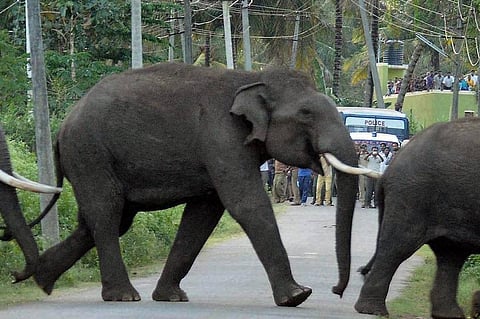

RAIPUR: The use of honeybee hives will soon be experimented upon as a protection mechanism to restrain the marauding wild elephants from causing havoc in eight states including Chhattisgarh.
Experts and scientists working in the field of honeybee have gone for intensive exercise to compose a Detail Project Report (DPR) taking a cue from the experience of South Africa model that showed the use of beehives to minimise invasive wild pachyderm raids that led to trauma for humans besides causing loss of property and agricultural crops.
According to the recent estimate of the environment ministry on an average 400 people lost their lives and around 100 elephants killed across India in human-elephant conflict every year. Various measures adopted by different state governments couldn’t effectively prevent the tuskers from causing destructions.
The scientists who attended the plenary session of Indian Council of Agriculture Research (ICAR) Biennial Workshop of the All India Coordinated Research Project on honey bees and pollinators held in Solan (Himachal Pradesh) in October last have formulated an idea on how the honey bees can be effectively used to keep elephant at bay. As a result, a DPR has recently been given a final shape.
“The humming tone produced by honey bees is actually ultrasound which is much unpalatable for the elephant. Such buzzing sound can only be heard by an elephant. It is this advantage that led the African scientists to devise a technique to use beehives as an effective guard and even profitable way to keep away elephants”, said Professor S S Shaw (Entomology), who was part of the expert team at Solan. Shaw is a director (Instructions) in Indira Gandhi Agriculture University, Raipur.
The practical knowledge and exposure of South African scientists and farmers on using beehive fences have been incorporated in the DPR. The surveys by the university too found that the herds of wild tuskers didn’t venture close to places where the beehives exist on trees.
“Practically they were effective and the success rate as high as over 80 percent. Local materials can be sourced to build beehives that can be placed as barriers along the designated borderlines of crops or human habitats. Eight affected states -- Chhattisgarh, Odisha, Bihar, West Bengal, Maharashtra, Goa, Jharkhand and Assam -- will be joining the project that will work on network mode”, Shaw told Express.
In Chhattisgarh, the project will be operated in northeast districts of Jashpur, Korba and Raigarh where herds of wild elephants frequently haunts the region. The cost of the beehive fencing project per centre is likely to be Rs 50-60 lakhs for a period of three years, it was told.